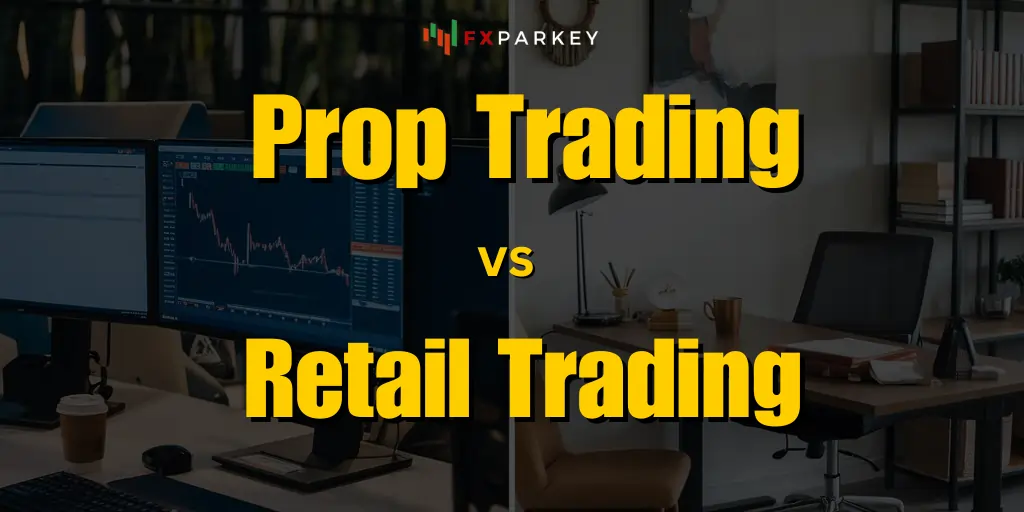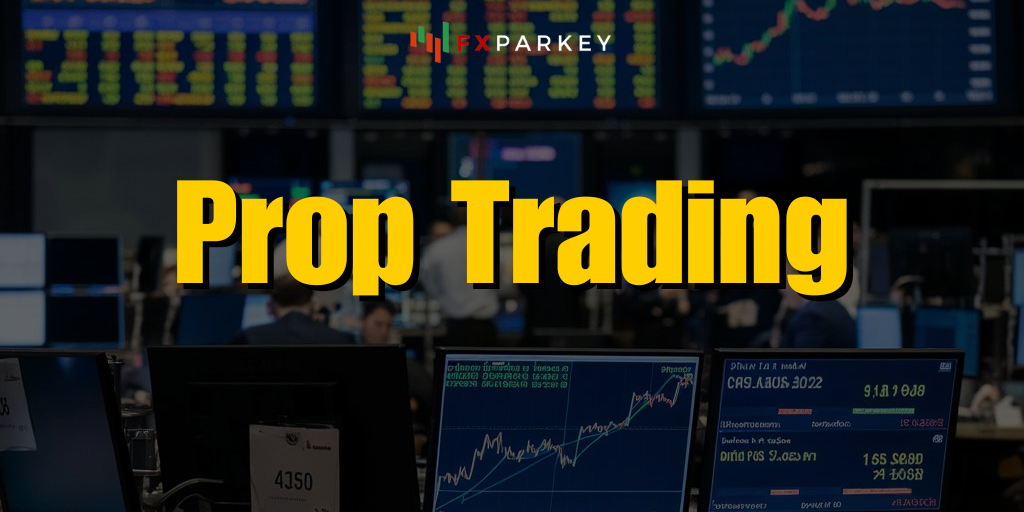
Prop trading vs retail trading: it's like comparing Formula 1 racing to your daily commute. Both involve getting from A to B, but the similarities end there. Buckle up as we explore this fascinating dichotomy.
While both involve buying and selling financial instruments, the two approaches are quite distinct. Prop trading is when firms use their own capital to make trades, while retail trading is when individuals use their personal funds. But the differences go much deeper than that.
In this article, we'll break down the key differences between these two trading approaches, exploring everything from the massive capital prop traders play with to the nimble strategies retail traders use to stay in the game.
💹 What is Prop Trading?

Proprietary trading, often referred to as “prop trading,” is a financial practice where firms use their own capital to trade various financial instruments for direct market gains. Unlike traditional trading models where firms execute trades on behalf of clients, prop trading involves the firm taking on market risk to generate profits for itself.
Definition and Explanation of Proprietary Trading
Prop trading occurs when a financial institution, such as an investment bank, hedge fund, or specialized prop trading firm, uses its own money to conduct financial transactions. These trades are typically speculative and are executed through a variety of complex investment vehicles and derivatives.
The primary goal of prop trading is to maximize profits by leveraging the firm's capital, expertise, and market insights. This approach allows firms to retain 100% of the profits generated from successful trades, rather than earning commissions from client transactions.
Key Characteristics of Prop Trading Firms
Prop trading firms possess several distinctive features that set them apart from traditional financial institutions:
Types of Prop Trading Strategies
Prop trading firms employ a wide range of strategies to capitalize on market opportunities:
💹 What is Retail Trading?

Retail trading refers to the practice of individual investors buying and selling financial instruments for their accounts. Unlike prop trading, retail traders use their capital and typically trade through brokerage firms or online platforms.
Definition and Explanation of Retail Trading
Retail trading involves non-professional market participants who trade securities for personal accounts. With the advent of online trading platforms and mobile apps, retail trading has become increasingly accessible to a broader audience.
Retail traders typically engage in various markets, including stocks, bonds, forex, and cryptocurrencies. They may employ different strategies, ranging from long-term investing to short-term trading and day trading.
Characteristics of Retail Traders
Retail traders exhibit several common characteristics:
Common Retail Trading Platforms and Tools
Retail traders have access to a variety of platforms and tools to facilitate their trading activities:
👉 Prop Trading Vs Retail Trading 👈
| Aspect | Prop Trading | Retail Trading |
|---|---|---|
| Capital Source | Firm's capital | Trader's personal capital |
| Risk Exposure | Limited to entry fee or evaluation cost | Full personal financial risk |
| Profit Sharing | Split profits with the firm (typically 70-80% to trader) | Keep 100% of profits |
| Trading Rules | Strict guidelines set by the firm | More autonomy in decision-making |
| Access to Tools | Advanced technology and data provided by the firm | Limited to personal resources or paid subscriptions |
| Leverage | Higher leverage potential | Limited by personal funds and broker regulations |
| Education/Support | Often provided by the firm | Self-directed learning or paid courses |
| Market Access | Potentially wider access to markets and instruments | Limited to what retail brokers offer |
| Regulatory Oversight | Less regulated (may change in future) | Heavily regulated |
| Performance Pressure | High expectations from the firm | Self-imposed pressure |
| Community | Access to a network of traders | Often solitary activity |
| Initial Investment | Usually smaller (evaluation fee or deposit) | Requires personal capital to start |
| Scalability | Can potentially manage larger amounts quickly | Growth limited by personal capital |
| Career Path | Potential for a professional trading career | Typically a personal endeavor |
| Risk Management | Often enforced by firm's rules | Self-managed |
💸 Capital and Resources

The disparity in available capital and resources between prop trading firms and retail traders is significant:
Differences in Available Capital
Prop trading firms typically have access to substantial capital, often in the millions or billions of dollars. This allows them to take larger positions and capitalize on smaller price movements. In contrast, retail traders are limited by their funds, which are generally much smaller in scale.
Access to Advanced Tools and Technology
Prop trading firms invest heavily in cutting-edge technology, including high-speed trading systems, advanced algorithms, and powerful data analysis tools. These resources enable them to execute trades with minimal latency and make data-driven decisions. Retail traders, while having access to increasingly sophisticated platforms, generally cannot match the technological capabilities of prop firms.
Research and Analysis Capabilities
Prop trading firms often employ teams of analysts, quants, and data scientists to conduct in-depth market research and develop complex trading strategies. They may also have access to exclusive data sources and proprietary analytical models. Retail traders typically rely on publicly available information and personal analysis, although some may subscribe to professional research services.
🤔 Risk Management

Risk management practices differ significantly between prop trading and retail trading:
Risk Tolerance and Exposure
Prop trading firms generally have higher risk tolerance due to their larger capital base and sophisticated risk management systems. They can take on more significant positions and employ complex strategies. Retail traders, with their limited capital, often need to be more conservative in their risk-taking to avoid substantial losses.
Regulatory Oversight and Compliance
Prop trading firms are subject to stringent regulatory oversight, particularly following the implementation of regulations like the Volcker Rule. They must adhere to strict compliance requirements and maintain robust risk management frameworks. Retail traders face fewer regulatory constraints but are protected by various investor protection measures.
Use of Leverage and Margin
Both prop trading firms and retail traders can use leverage to amplify their trading positions. However, prop firms often have access to higher levels of leverage due to their institutional status and risk management capabilities. Retail traders are typically subject to stricter margin requirements and leverage limits imposed by brokers and regulators.
🔎 Trading Strategies

The trading strategies employed by prop trading firms and retail traders can vary significantly:
High-Frequency Trading vs. Long-Term Investing
Prop trading firms often engage in high-frequency trading, executing numerous trades within milliseconds to capitalize on small price discrepancies. Retail traders, on the other hand, tend to focus more on longer-term investment strategies or day trading with less frequent transactions.
Algorithmic Trading Opportunities
Prop trading firms extensively use algorithmic trading strategies, leveraging complex mathematical models and machine learning algorithms to identify and execute trades automatically. While some retail traders employ algorithmic trading, their access to sophisticated algorithms and execution capabilities is generally more limited.
Market Making and Liquidity Provision
Many prop trading firms act as market makers, providing liquidity to the market by continuously quoting buy and sell prices for various securities. This activity is less common among retail traders, who typically act as price takers rather than price makers.
📌 Market Access

The level of market access differs between prop trading firms and retail traders:
Direct Market Access vs. Broker-Mediated Trades
Prop trading firms often have direct market access, allowing them to execute trades directly on exchanges without intermediaries. This reduces latency and transaction costs. Retail traders typically rely on broker-mediated trades, which may involve additional fees and slightly longer execution times.
Trading Hours and Market Availability
Prop trading firms, especially those engaged in global markets, may have the capability to trade 24/7 across various time zones. Retail traders are generally more limited by standard market hours and their personal schedules.
Access to Different Asset Classes and Markets
Prop trading firms can access a wide range of asset classes and markets, including exotic derivatives and over-the-counter products. Retail traders usually have more restricted access, primarily trading in stocks, ETFs, forex, and some commodities.
💰 Profit Potential and Compensation

The compensation structures and profit potential differ significantly between prop trading and retail trading:
Salary and Bonus Structures in Prop Trading
Prop traders often receive a base salary plus performance-based bonuses. These bonuses can be substantial, sometimes exceeding the base salary many times over for successful traders.
Commission-Based Earnings for Retail Traders
Retail traders typically do not earn salaries or bonuses for their trading activities. Their profits come directly from successful trades, minus any transaction costs or commissions charged by their brokers.
Profit-Sharing Arrangements and Performance Metrics
Prop trading firms often implement profit-sharing arrangements, where traders receive a percentage of the profits they generate for the firm. Performance metrics such as Sharpe ratio, maximum drawdown, and risk-adjusted returns are commonly used to evaluate prop traders. Retail traders are solely responsible for their profits and losses, without formal performance evaluations.
By understanding these key differences between prop trading and retail trading, individuals can make more informed decisions about which path aligns best with their goals, resources, and risk tolerance in the financial markets.
All Common Queries
What is the main difference between prop trading and retail trading?
Prop traders use a firm's capital and share profits, while retail traders use their own money and keep all profits.
Which type of trading offers more autonomy?
Retail trading provides more autonomy, as traders make their own decisions without external influence.
How does capital access differ between prop and retail trading?
Prop traders typically have access to larger amounts of capital provided by the firm, while retail traders are limited to their personal funds.
Are there different licensing requirements for prop and retail trading?
Yes, prop trading often requires securities licensing, while retail trading doesn't require any specific licenses or paperwork.
How do risk dynamics differ between prop and retail trading?
In prop trading, the firm absorbs most of the financial risk, while in retail trading, the individual trader bears all the risk.
Which type of trading offers better educational resources?
Prop firms generally provide more hands-on, valuable training since their own capital is at stake.
How do profit-sharing models differ between prop and retail trading?
Retail traders keep 100% of their profits, while prop traders typically split profits with the firm, often receiving 70-80%.
💹 The Bottom Line

prop trading and retail trading each offer distinct advantages and challenges. Prop traders benefit from the resources, capital, and collaboration of their firm, but face high-performance pressure. Retail traders have more independence and flexibility, but lack the same level of support and must rely more on their own skills and discipline.
Ultimately, the choice between prop trading and retail trading depends on an individual's personality, risk tolerance, experience level, and career goals. Aspiring traders should carefully consider the tradeoffs of each path. With hard work, continuous learning, and proper risk management, it is possible to find success and build a trading career through either the prop trading or retail trading route.






